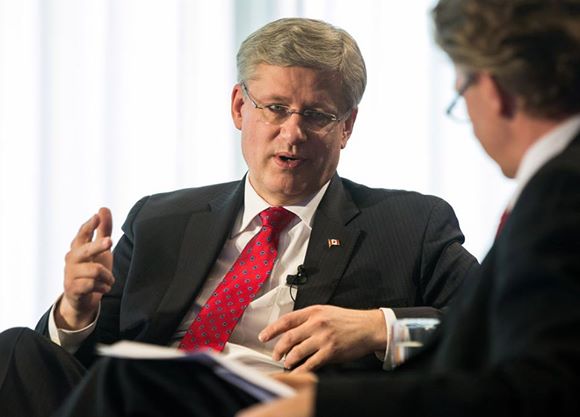
OTTAWA — Prime Minister Stephen Harper is urging a House of Commons committee to study the government’s anti-terror bill as quickly as possible, in spite of accusations the Conservatives are using their majority to rush the legislation onto the books.
NDP Leader Tom Mulcair told the Commons on Tuesday it is essential to scrutinize the bill, and asked Harper to ensure that security and human rights experts are not only heard, but also heeded.
The Conservatives brought in the bill — which would significantly expand the powers of Canada’s spy agency — following the murders of two Canadian soldiers last October.
The bill would also make it easier for authorities to control the movements of terror suspects, expand no-fly list powers, crack down on extremist propaganda and outlaw encouraging someone to commit a terrorist act.
The NDP opposes the legislation, saying it threatens civil liberties and fails to make Canadians safer.
Harper dismissed Mulcair’s criticisms and said the public strongly supports the proposals.
“I would urge the committee to study this bill as quickly as possible, in order to ensure the adoption of these measures to ensure the security and safety of Canadians,” Harper said.
NDP public safety critic Randall Garrison said the Conservatives rammed the legislation through the House.
“Will the government commit today to a full and proper study of this sweeping security bill?”
The NDP hopes to call anywhere from 80 to 100 witnesses to testify on the bill during more than two dozen meetings, and as of Tuesday had finalized a preliminary roster of 20 names. They include four former prime ministers and several retired Supreme Court justices who recently published a statement calling for increased oversight of Canadian intelligence activities.
The New Democrats also want to hear from Eva Plunkett, the former inspector general of the Canadian Security Intelligence Service, whose office was abolished as a cost-cutting measure.
Critics including the NDP and Liberals have called for more robust oversight to complement the work of the Security Intelligence Review Committee, the remaining watchdog charged with keeping an eye on CSIS.
Estimated budget figures published Tuesday put the watchdog’s planned expenditures for 2015-16 at $2.8 million, only slightly above this year’s allotment. The estimate for CSIS, meanwhile, was $537 million, up almost $21 million from last year.